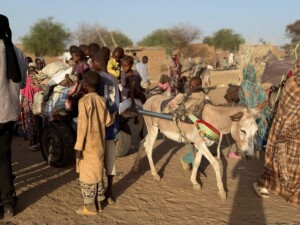Sudan’s new Revolutionary Movt to focus on rural areas, calls for wide participation in today’s protests
The SPLM-N Democratic Revolutionary Movement split-off group headed by Yasir Arman, former political advisor to the government of Abdallah Hamdok, called on the Sudanese in a statement yesterday to join the demonstrations against the coup d’état that took place on October 25 one year ago. This weekend, the group’s Central Council members met for the first time and agreed to focus on the Sudanese “living in the countryside”.
 Members of the SPLM-N Democratic Revolutionary Movement Central Council, Khartoum, October 23 (Tweet Yasir Arman)
Members of the SPLM-N Democratic Revolutionary Movement Central Council, Khartoum, October 23 (Tweet Yasir Arman)
The SPLM-N Democratic Revolutionary Movement split-off group headed by Yasir Arman, former political advisor to the government of Abdallah Hamdok, called on the Sudanese in a statement yesterday to join the demonstrations against the coup d’état that took place on October 25 one year ago. This weekend, the group’s Central Council members met for the first time and agreed to focus on the Sudanese “living in the countryside”.
The Sudan People’s Liberation Movement-North–Democratic Revolutionary Movement (DRM) was formed after Malik Agar, leader of the SPLM-N Agar and member of the Sovereignty Council, and his deputy Yasir Arman “amicably” agreed to split in mid-August this year.
In its statement posted on social media on Monday, the Central Leadership Council of the DRM said that the meeting “in which the members of the council inside and outside Sudan participated” was held at the movement’s offices in Khartoum on 22-23 October.
Yasir Arman was elected president of the DRM, Buseina Dinar vice president.
The group agreed to “deal with a revolution, not a political crisis”. The members emphasised the importance to separate religion from the state, to build a nation based on democracy and citizenship without discrimination, and form “a broad civil front that will join possible upcoming elections with a unified list to complete the tasks of the glorious [2018] December revolution through a peaceful transfer of power”.
In the discussions, the council members noted that the vast majority of the Sudanese live in the countryside, and that “the destruction inflicted on them has led to large, unproductive migrations towards cities, towns, and neighbouring rural areas, where the state has been unable to provide services.
Therefore, the DRM adopted “a strategy to build a democratic membership movement linking the countryside with the city”, while adhering to “the vision of a new Sudan” based on civil society, and “sustainable governance”.
“Real reform must lead to the restoration of the productive face of the countryside and the modernisation of agriculture and herds grazing. One of the basics of national economic reform is to pay attention to the people of the countryside and the city together,” the members agreed.
The DRM as well prioritised the reform of the security, military and justice sectors, respect for human rights, the Rule of Law, the lifting of impunity [of the various security forces], and the principle of accountability.
The meeting further discussed the Juba Peace Agreement, signed by the Sudanese government of Abdallah Hamdok and the members of the Sudan Revolutionary Front rebel alliance in the South Sudanese capital in October 2020. The participants agreed that the political contents must be reviewed “while the gains for the war zones should be preserved and the urgent issue of eastern Sudan should be resolved in an equitable manner and with the participation of all stakeholders”.
The DRM Central Council also stressed the need to strengthen the Forces for Freedom and Change alliance “by opening up to the forces of the revolution without conditions” and giving a voice to the resistance committees in the country.
“The December Revolution provided the will, the environment, and the human resources needed for change, to build a new Sudan, as the current nation is aging and unable to carry out its tasks.”
The statement concluded by calling for wide public participation in the October 25 demonstrations “to end the coup”.











 and then
and then